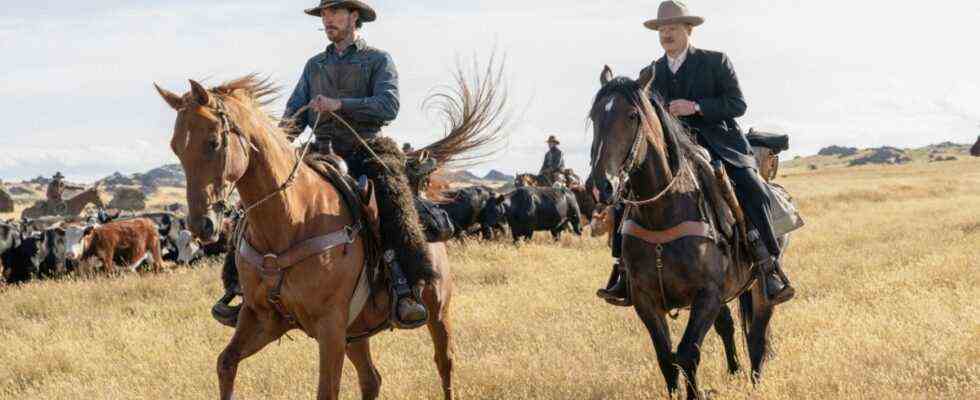If ever there was a writer who didn’t think the Wild West was romantic, it was Thomas Savage. Savage, born in Salt Lake City in 1915 and raised in Montana, was the antithesis of Owen Wister, who caused a sensation with Wild West novels (including “The Virginian”), but who actually came from a wealthy Philadelphia family. Savage hated ranch life, believing that the harsh nature and habits shape people. His Phil Burbank is one of those guys. He mocks his sister-in-law, and some of his humiliations are even quite costly; and when he notices that she is secretly drinking because she can hardly stand having to live with him under one roof, he uses that against her too. He doesn’t like washing himself because he finds bathing unmanly and is cruel to everyone, ultimately also to himself.
You wouldn’t think of casting the British actor Benedict Cumberbatch, who specializes in capricious fine spirits, in this role, but that’s exactly what Jane Campion chose as the anti-hero in her film adaptation of Savage’s “The Power of the Dog”. In the first scene, the nasty Phil is in top form. With his cowboys he visits a restaurant near the ranch, the widow Rose (Kirsten Dunst) runs it in the small town in Montana at the beginning of the twenties. Phil and his boys rumble through the restaurant, frightening the other guests and teasing their son Peter (Kodi Smit-McPhee), who folds napkins into figures. In the end, Rose holed up in tears in the kitchen. Phil may have made a mistake there. His brother George (Jesse Plemons), with whom he owns the ranch and who is a tidier person than himself, goes after her to apologize for the whole gig, and very soon Phil sees Rose again – as George’s wife.
It’s not easy, with the wilderness and with men: Kirsten Dunst as Rose.
(Photo: AP / Netflix)
The ranch won’t become a home for Rose because Phil makes sure that she can never relax. Peter goes to school in town and only comes for the holidays, but an unexpected friendship soon breaks out between him and Phil. One suspects that Phil’s manliness mania is supposed to hide completely different emotions, for example that he only ever really loved his deceased friend Bronco Henry – and in the tender boy with his sense of aesthetics, of all people, he is now looking for a ranch apprentice to ride out with him Knows ropes from leather strips.
Campion, who almost thirty years ago carried out a triumphal procession from Cannes to the Oscars with “Das Piano”, has masterfully resurrected the American West as an inhospitable place – for “The Power of the Dog”, which will be in German theaters this week and on Netflix from December onwards, it was awarded the Silver Lion for best director at the Venice Film Festival that year. Her characters, above all the nasty Phil, develop a special pull. In a wonderful scene, Burbank sadly caresses Bronco Henry’s silk scarf; and a piano plays a major role in one of his ingenious disgusts.
Nevertheless, the westerns by American Kelly Reichardt – her latest, “First Cow”, starts in Germany this week too – seem more concentrated. For Campion and Reichardt, the genre is a good place to show society in a kind of original state. But there is one major difference: In “First Cow” Reichardt examines how trade and property change the community, degrade solidarity and undermine the sense of justice. Whether Jane Campion is aware of it or not: In the community she describes, no one has a pale mistake about justice, neither does Phil nor the victims of his atrocities.
Fiction is a place beyond good and bad
This peculiar ambivalence of all characters is perhaps due to the novel. Savage, who wrote “The Power of the Dog” in 1967, actually processed his own family history here: It was his own mother who married into the rancher family Brenner and started drinking; he actually had an uncle who, like Phil was a scoundrel and misogynist in his fiction – but one can assume that Savage, who should have found himself in the boy who tries to save his mother, dreamed of the end of the novel as a healing fiction.
Fiction is a place beyond good and evil, but cinema nonetheless has a different relationship to reality. She works with natural light, you can almost feel the damp cold of Montana – although she actually shot in New Zealand – and she goes very close to her performers, watching how their hands touch the objects around them. So she tries to create a world that seems almost tangibly real, and in which the idea of a just murder develops a strange aftertaste. Perhaps “The Power of the Dog” is best seen as an offer to reflect on the relationship between vigilante justice and justice.
The Power of the Dog – New Zealand / Australia 2021. Directed and written by Jane Campion. Camera: Ari Wegner. With: Benedict Cumberbatch, Kirsten Dunst, Kodi Smit-McPhee, Jesse Plemons. Netflix, 128 minutes.

